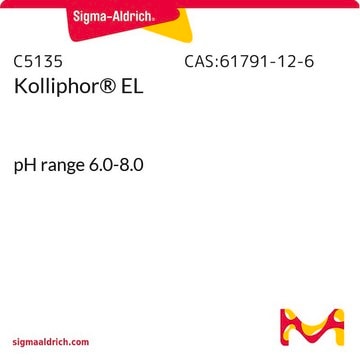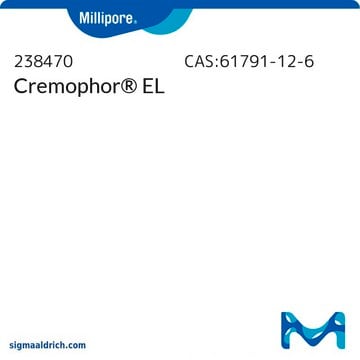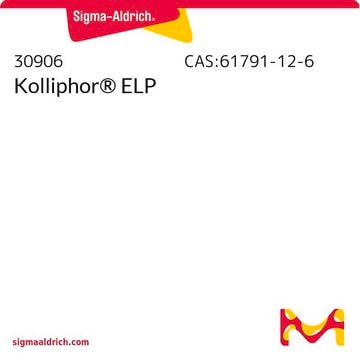42966
12-Hydroxy-octadecanoicacid polymer with α-hydro-ω-hydroxypoly(oxy-1,2-ethanediyl)
Synonym(s):
HS 15, Macrogol (15)-hydroxystearate, Polyethylene glycol (15)-hydroxystearate, Polyoxyethylated 12-hydroxystearic acid, Solutol® HS 15
About This Item
Recommended Products
description
non-ionic
Quality Level
form
paste
composition
free macrogoly% (27.0 - 39.0 g/100g (%))
impurities
acetic acid (≤ 0.5 g/100g (%))
water (≤ 0.5 g/100g (%))
≤0.05% acetic acid
≤0.05% water
≤1 mg/kg ethylene oxide ((ppm))
≤1 mg/kg ethylene oxide
≤1 mg/kg nickel ((ppm))
≤1 mg/kg nickle
≤10 mg/kg dioxane ((ppm))
≤10 mg/kg dioxane
≤10 mg/kg heavy metals
≤620 mg/kg Diethylene glycol
≤620 mg/kg diethylene glycol ((ppm))
≤620 mg/kg ethylene glycol ((ppm))
≤620 mg/kg ethylene glycol
<10 mg/kg heavy metals ((ppm))
ign. residue
(≤ 0.3 g/100g (%))
pH
5.0-7.0 (1 g/10 mL in H2O)
mp
25 - 30 °C (77 - 86 °F)
acid value
≤1.0 mg KOH/g
hydroxyl value
90‑110 mg KOH/g
iodine value
≤2.0 g I2/100 g
peroxide value
≤3.0 meq/kg
saponification value
53‑63 mg KOH/g
solubility
water: 200 g/L at 30 °C (86 °F)
density
1.048 g/cm3 at 20 °C (68 °F)
1.03 g/cm3 at 60 °C (140 °F)
anion traces
<1 ppm (Ethylene Oxide)
<10 ppm (Dioxane)
cation traces
Ni: <1 ppm
heavy metals: <10 ppm
application(s)
sample preservation
SMILES string
C(CCCCC(CCCCCCOCCOCCOCCOCCOCCOCCOCCOCCOCCOCCOCCOCCOCCOCCOCCO)O)CCCCC(=O)O
InChI
1S/C47H94O19/c48-15-17-53-19-21-55-23-25-57-27-29-59-31-33-61-35-37-63-39-41-65-43-45-66-44-42-64-40-38-62-36-34-60-32-30-58-28-26-56-24-22-54-20-18-52-16-11-7-6-9-13-46(49)12-8-4-2-1-3-5-10-14-47(50)51/h46,48-49H,1-45H2,(H,50,51)
InChI key
CYAMZYIUAHNTBO-UHFFFAOYSA-N
General description
Application
- 12-Hydroxy-octadecanoic acid polymer with α-hydro-ω-hydroxypoly(oxy-1,2-ethanediyl) has been used:
- in dissolving dexamethasone (DEX) to intraperitoneally inject the mice to test its grip strength to measure the muscle force
- in roflumilast preparation to treat rabbits and guinea pigs to study the mechanisms and pharmacological sensitivity of ozone-induced hypertussive responses
- to dissolve finerenone for oral application in in vivo-studies
Biochem/physiol Actions
Other Notes
Legal Information
Certificates of Analysis (COA)
Search for Certificates of Analysis (COA) by entering the products Lot/Batch Number. Lot and Batch Numbers can be found on a product’s label following the words ‘Lot’ or ‘Batch’.
Already Own This Product?
Find documentation for the products that you have recently purchased in the Document Library.
Customers Also Viewed
Our team of scientists has experience in all areas of research including Life Science, Material Science, Chemical Synthesis, Chromatography, Analytical and many others.
Contact Technical Service










